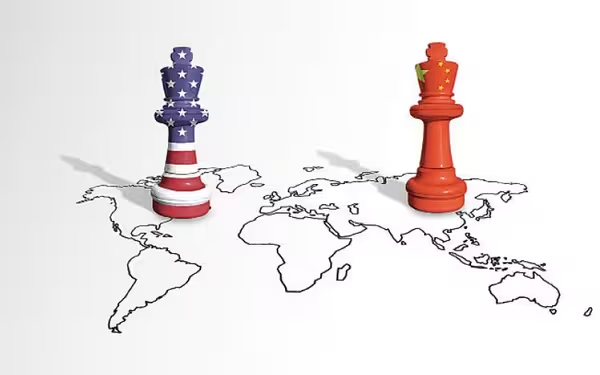Saturday, November 16, 2024 05:49 PM
Trump's Economic Policies Threaten Global Trade Stability
- Trump's tariffs could spark new trade wars.
- Emerging markets face economic challenges ahead.
- EU braces for potential retaliatory measures.
 Image Credits: dawn
Image Credits: dawnTrump's potential return raises concerns over global trade stability, impacting emerging markets and EU economies.
Donald Trump’s potential return to the White House has raised significant concerns among global leaders, particularly in Europe. His previous presidency was marked by protectionist policies that many believe could lead to a new era of trade wars, threatening the long-standing principles of globalization. As Trump prepares for a possible second term, European Union (EU) officials and economists are voicing their fears that his approach could disrupt global trade, especially with China, and undermine the rules-based trading system established by the World Trade Organization (WTO).
During his first term from 2017 to 2021, Trump implemented tariffs that primarily targeted China, imposing a 25% tariff on European steel and a 10% tariff on aluminum, citing “national security concerns.” While these measures did not significantly harm European businesses at the time, they strained the multilateral trade regime. The situation has evolved, and now, Trump’s rhetoric appears to extend beyond China, potentially affecting European economies like Germany and France, which are heavily reliant on exports.
EU officials are already preparing for possible retaliatory measures if Trump follows through with his proposed tariffs, which could range from 10% to 20% on imports from countries outside China, with a staggering 60% tariff on Chinese goods. Such drastic measures could lead to economic repercussions not seen since the Great Depression, according to various reports. The implications of these tariffs could be severe, with estimates suggesting a potential reduction in global economic growth by one percentage point by 2026.
Furthermore, a study from the London School of Economics predicts that China’s GDP could decrease by 0.68%, while the EU could see a 0.11% reduction. The Kiel Institute for the World Economy warns that a breakdown of the WTO could lead to significant economic losses, particularly for Germany and China. The EU’s priority must be to maintain the global trade system, as the costs of fragmentation could far outweigh the consequences of a bilateral dispute with the US.
As the US presidential race unfolds amid fears of unrest and chaos, the implications of Trump’s protectionist policies could extend beyond Europe. Emerging markets and developing economies, such as Pakistan, may face increased challenges. The anticipated strengthening of the US dollar, driven by higher inflation from proposed tariffs and tax cuts, could lead to a depreciation of other currencies. This would make imports more expensive and complicate the repayment of dollar-denominated debts for countries reliant on dollar funding.
The potential return of Donald Trump to the presidency could have far-reaching negative effects on the global economy, particularly for emerging markets like Pakistan. As nations brace for the impact of his proposed economic policies, it is crucial for global leaders to prioritize cooperation and uphold the principles of a rules-based trading system. The stakes are high, and the world is watching closely as the future of international trade hangs in the balance.













